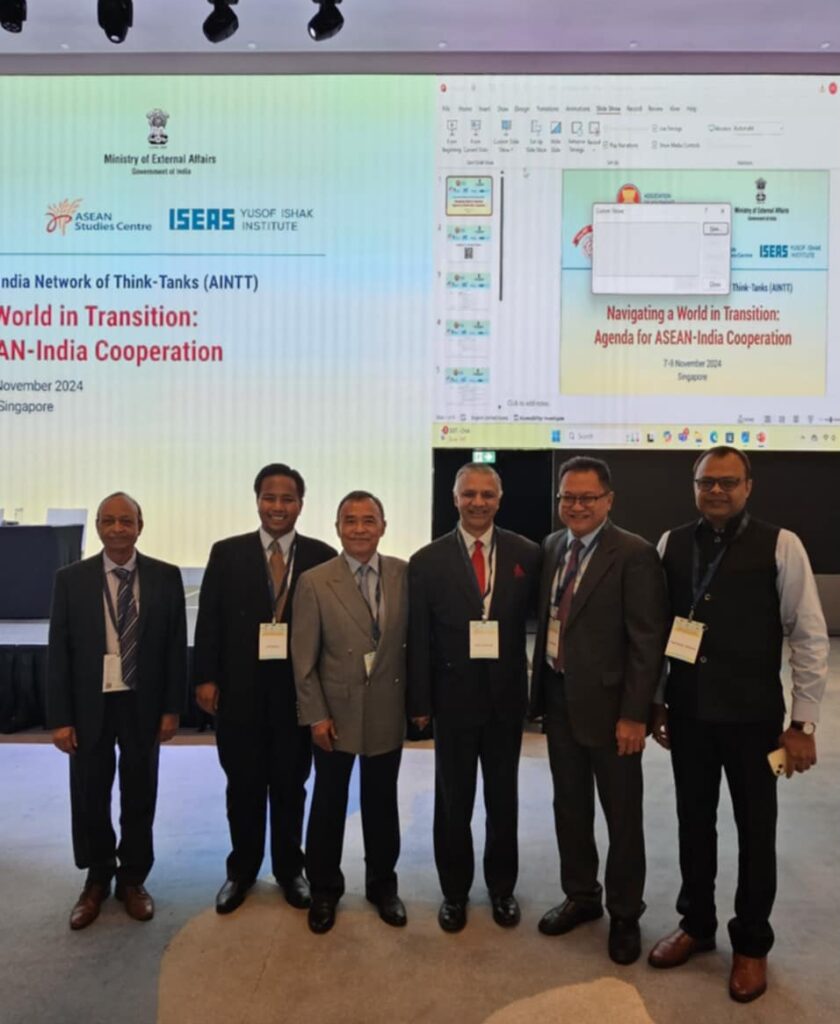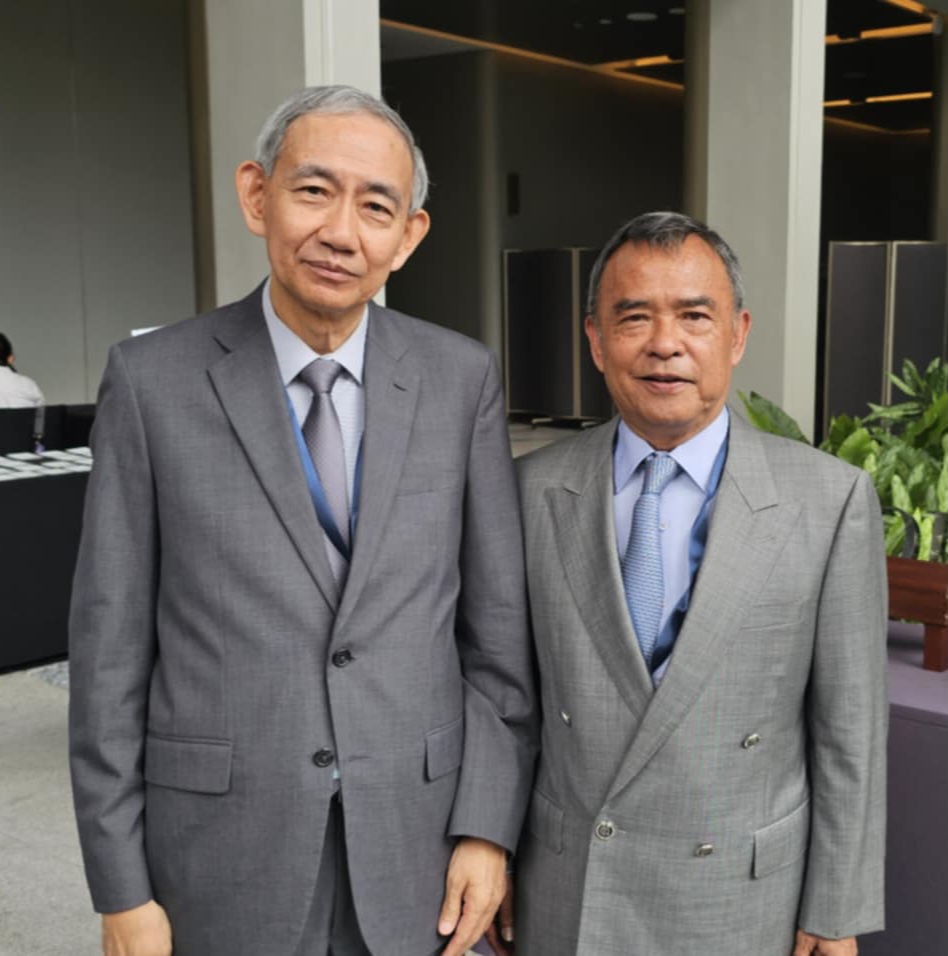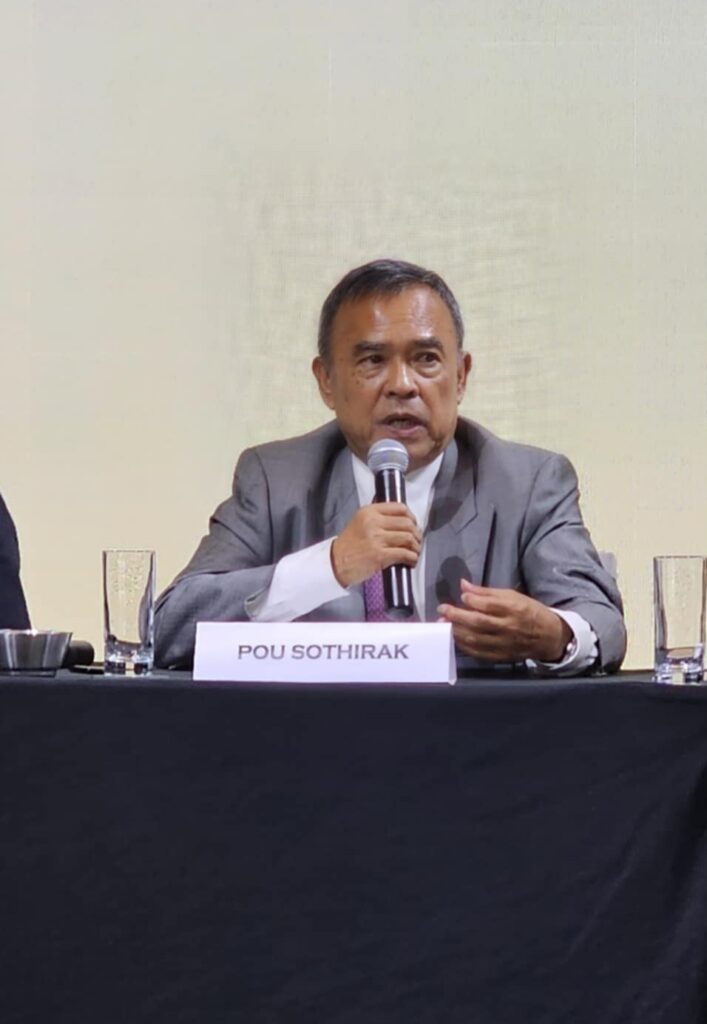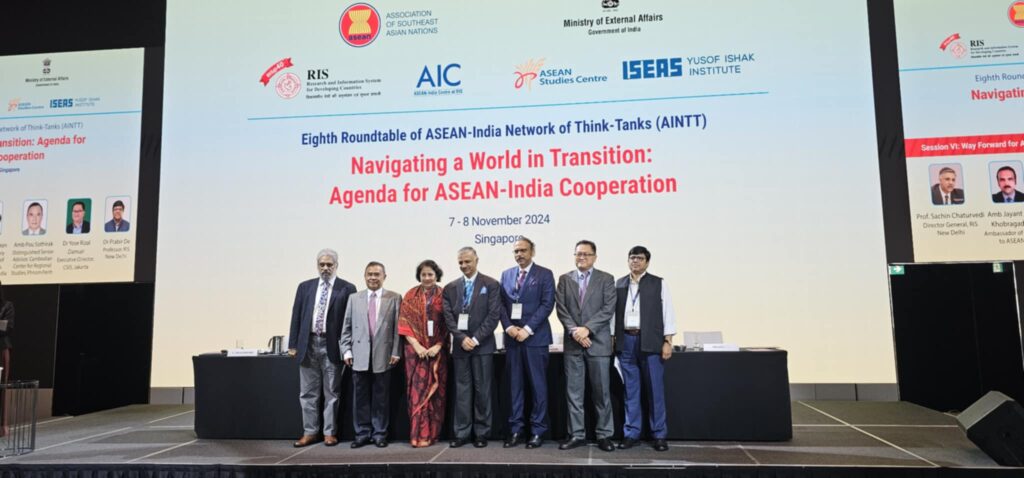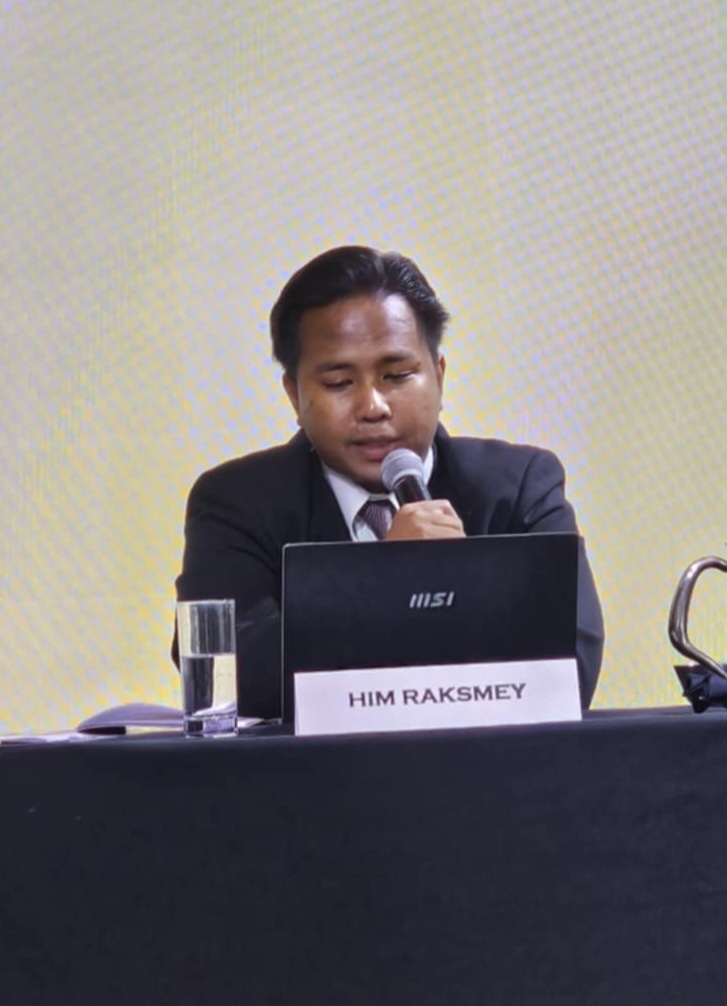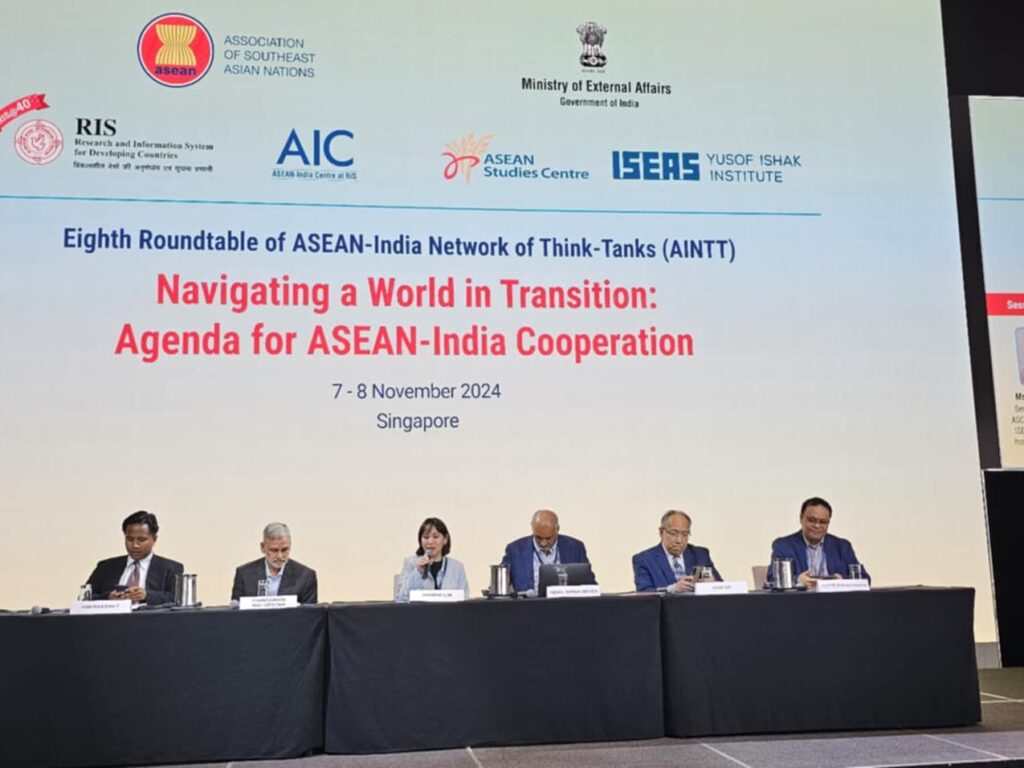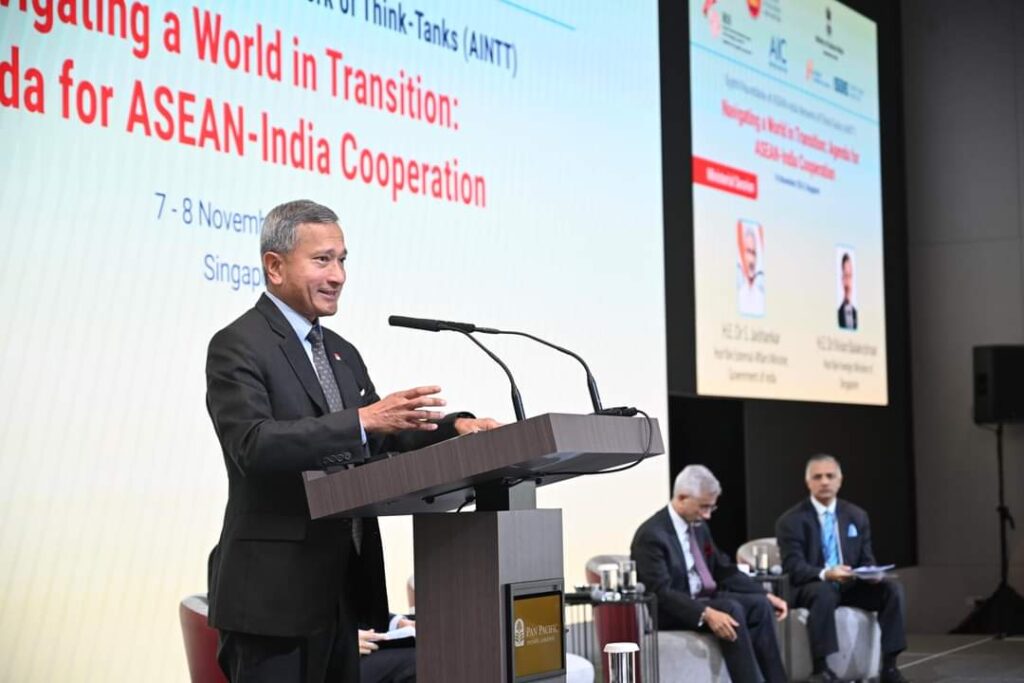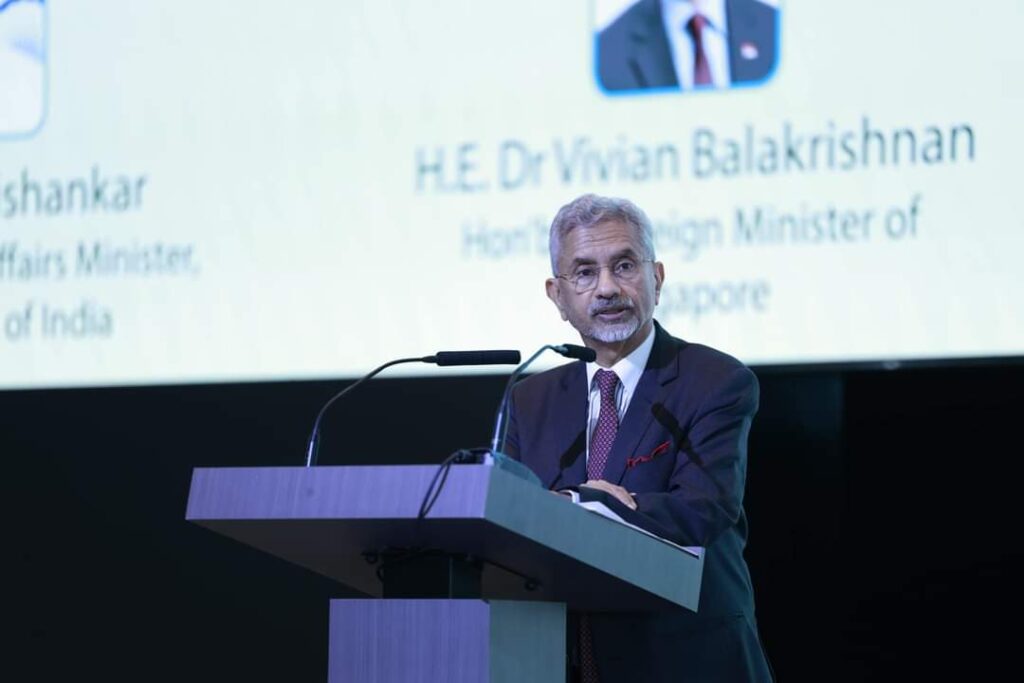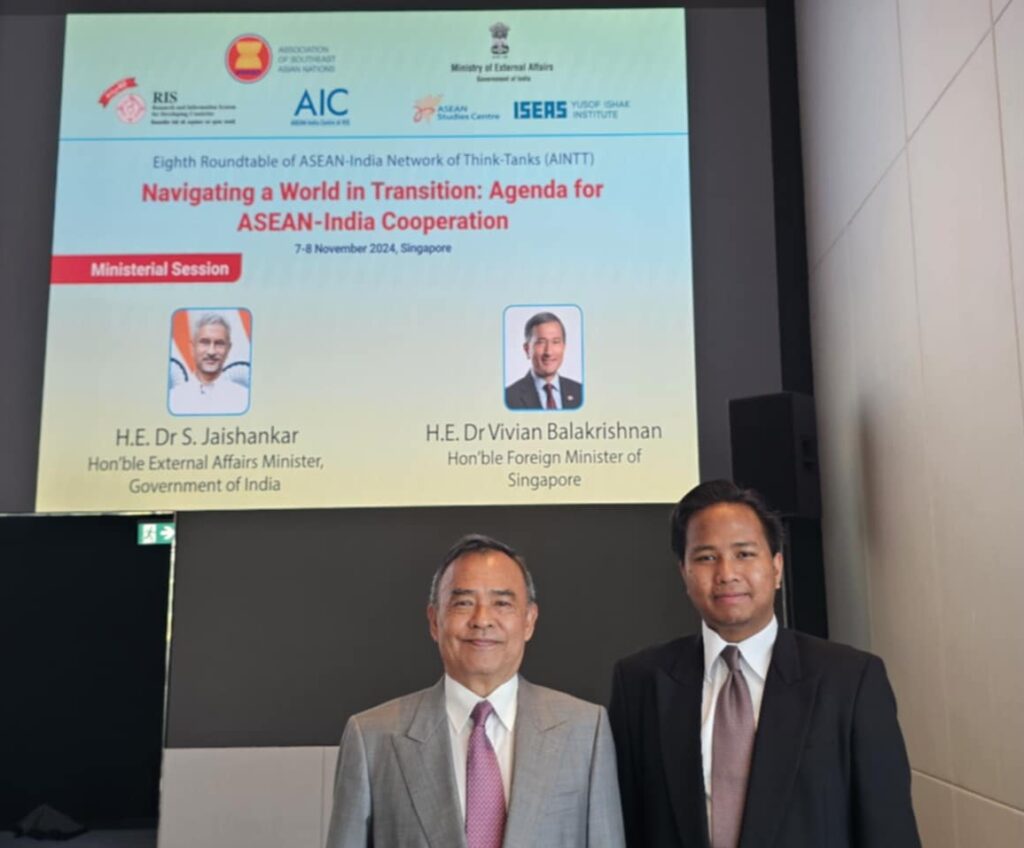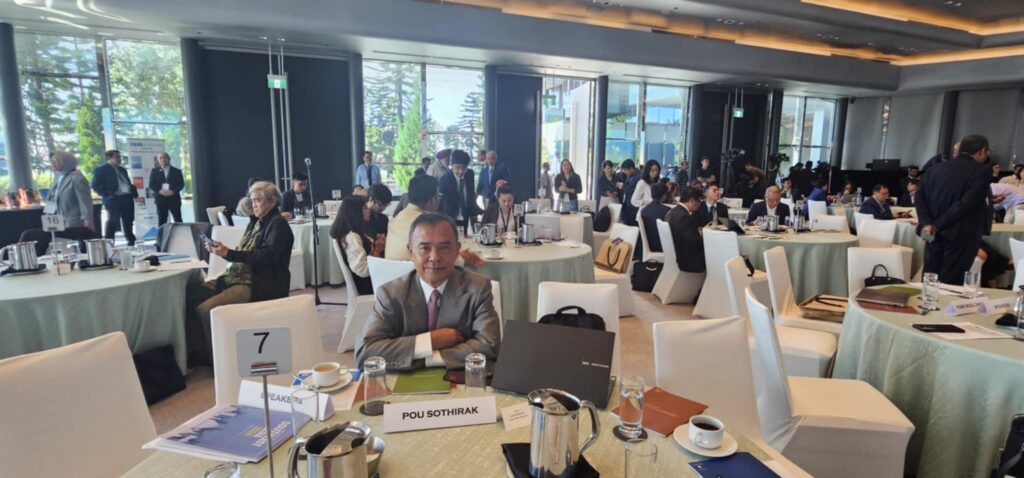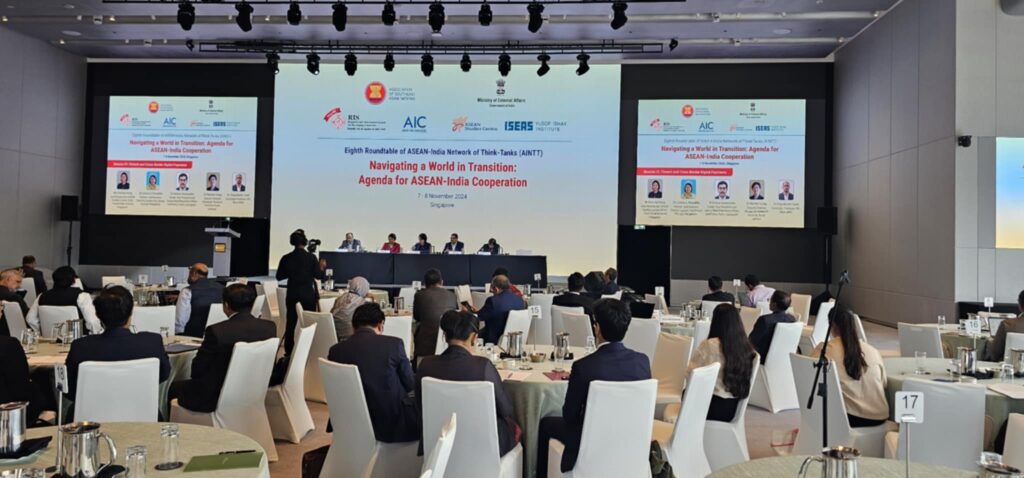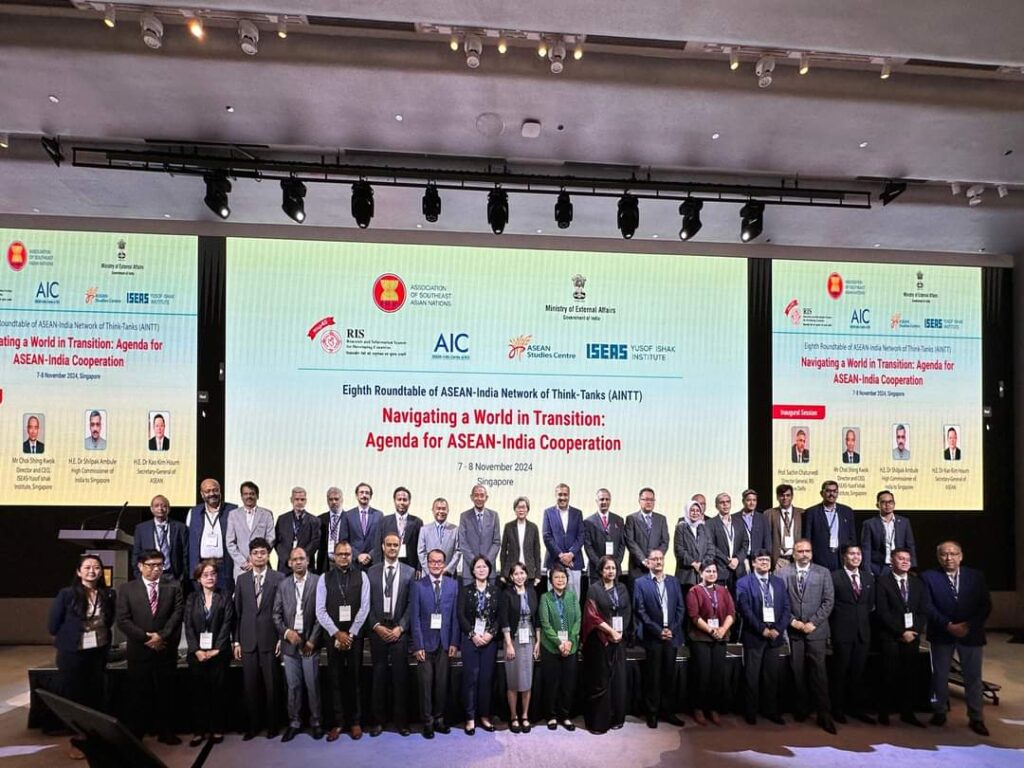From 7-8 November 2024, in Singapore, Amb. Pou Sothirak, Distinguished Senior Advisor to CCRS, and Mr. Him Raksmey, Executive Director of CCRS, were invited to speak at the 8th Roundtable of ASEAN-India Network of Think Tanks (AINTT) under the theme of “Navigating a World in Transition: Agenda for ASEAN-India Cooperation”, organized by the Research and Information System for Developing Countries (RIS), and ISEAS Yusof Ishak Institute, and supported by Ministry of External Affairs of India, Ministry of Foreign Affairs of Singapore, and the ASEAN Secretariat.
The event aimed to bring together thought leaders, scholars, policymakers, and business leaders from the ASEAN region and India to discuss and deliberate on the common economic, geopolitical and geostrategic challenges and opportunities faced by ASEAN and India. More than 80 participants attended this roundtable discussion.
There were interesting discussions by policymakers and experts on what ASEAN and India can do together to further enhance their Comprehensive Strategic Partnership, officially elevated since 2022. The Roundtable was organized around six sessions dedicated to the deliberation on key critical issues, including 1/ connectivity and regional value chains, 2/ ASEAN-India cooperation on green energy transition, 3/ digitalization and development of Micro, Small and Medium Enterprises (MSME), 4/ Fintech and cross-border digital payments, 5/ strengthening the international rule of law using the Treaty of Amity and Cooperation (TAC), and 6/ ways forward for ASEAN-India relations.
There was also a high-profile ministerial session held to discuss the state of ASEAN-India partnership by H.E. Dr. Vivian Balakrishnan, Foreign Minister of Singapore, and H.E. Dr. S. Jaishankar, Minister of External Affairs of India.
At this roundtable forum, the CCRS delegation made contributions to the discussions to foster ASEAN-India relations. Mr. Him Raksmey, Executive Director of CCRS, was invited to speak at the 5th Session on “Strengthening International Rule of Law Using the Treaty of Amity and Cooperation (TAC)”. He shared his views on the relevance and challenges posed to TAC, and what ASEAN and India can work collaboratively to make TAC more effectively, including promoting a more favorable regional security environment conducive to the implementation of TAC, reviewing and broadening scopes of TAC, and engaging India in helping make dispute settlement mechanisms under TAC works better in dealing with pressing regional issues including South China Sea, and Myanmar Crisis.
Amb. Pou Sothirak, Distinguished Senior Advisor to CCRS, was invited to be a distinguished speaker at the 6th Session under the sub-theme of “Ways Forward for ASEAN-India Relations”. He made some suggestions to strengthen the existing agenda of cooperation between ASEAN and India to further navigate safely in the present context of the world in transition which included the following key points:
- The two sides must work harder for long term partnerships and address gap that exist within their common vision, political will, courage and preparedness to tackle future challenges by addressing common deficits and any possible misunderstanding to allow their relationship to reap full benefits of mutual cooperation.
- India should strive further to support the ASEAN Community building efforts. Being a Comprehensive Strategic Partner to ASEAN, India could assist ASEAN to take stock to see if ASEAN Community Vision 2025 has been able to make ASEAN more united, inclusive and resilient community and hasten regional integration and enhance connectivity across economic and socio-cultural sectors, as well as to respond effectively to the volatile global trends and internal contests or not?
- India can help ASEAN to identify what lessons could be learned to strike a balance between ambition and pragmatism, and how best to support a resilient institutions and processes to encourage a more inclusive people center approach to integration, as issues and their solutions risk undercutting multiple sectors.
- India should endeavor to work closely with ASEAN to inject greater viability of the 2045 Vision to project its vigor well in the next 20 years in revitalizing ASEAN strategic outlook for the future, aspiring to become a credible hub of regional cooperation in the Indo-Pacific region, safeguarding ASEAN’s strategic autonomy and its ability to maneuver smartly in this world in transition.
- For rule-based order and multilateralism, India and ASEAN should: 1/ stand firm on the rules-based order by proclaiming that such an order is the cornerstone of peace, stability and prosperity; 2/ reinvigorate Multilateralism by not putting any country’s interest above others but advocate instead the equal right to peaceful coexistence shared by all countries; 3/ promote multilateral institutions in Southeast Asia to uphold greater institutionalization and binding commitments, shifting from a mere problem-solving exercise in managing regional disorder toward a liberal rules-based order; 4/ work together to achieve the kind of security arrangements that lead to the reduction of tensions and dispel ill-intend mutual trust caused by strategic competition among the great powers.
CCRS would like to express our deep appreciation to RIS and ISEAS Yusof Ishak Institute for engaging us in this productive and well-organized forum.
The Key Takeaways of the 8th AINTT included:
Connectivity and Regional Value Chains
- The global value chains have witnessed deep challenges due to interrelated factors such as new industrial innovations such as advanced robotics, 3D printing and Artificial Intelligence (AI), growing economic nationalism and intensifying geopolitical contestations, downsizing of international production system, and continued negative impacts of the Covid-19 pandemic on global and regional trade and value chains. All these factors have caused risks and vulnerabilities to ASEAN and India, especially in the context of trade and regional value chains.
- There have also been trade tensions between ASEAN and India, including trade deficit, implementations of rules of origin, tariffs and non-tariff barriers between the two sides.
- ASEAN and India can work together on key issues such as simplifying rules of origin, addressing trade tensions more constructively, reducing tariffs and non-tariff barriers to encourage more regional economic integrations and value chains between ASEAN and India.
ASEAN-India Cooperation for Green Energy Transition
- India and ASEAN have pledged to cooperate on climate change and green energy transition in order to reach carbon neutrality and curbing reliance on fossil fuels. How to transform this ambition into a reality remains a dauting task for the two sides due to limited political willingness, different stages of national developments, domestic constraints, tensed external environment, limited technological transfer, lack of coordinated investments, resource mobilization and infrastructure to support smoothly the green energy transition.
- Cross-country knowledge sharing, capacity building, technical assistance, collaborative research and development projects, and undertaking joint renewable energy projects are critical for both ASEAN and India to promote green energy transition.
Digitalization and Development of Micro, Small and Medium Enterprises (MSME)
- Digital transformation and proliferations of MSMEs present an enormous opportunity for economic growth for ASEAN and India. But key challenges such as cumbersome regulations and custom procedures, financial constraints, limited capacity, and digital divides among ASEAN countries and India continue to persist, hampering the growth potentials.
- Both ASEAN and India should put more efforts in simplifying and harmonizing regulations on digitalization and MSMEs, put in place investments on digital acceleration and provide financial accessibility for MSMEs, and conduct joint research studies how the two sides can reinvigorate collaborations in this area.
Fintech and Cross Border Digital Payment
- Financial Technology (Fintech) emerges as an important area of cooperation between ASEAN and India to help facilitate cross border digital payment between the two sides given frequent transactions in trade and investment have amounted billions of USD annually. However, the state of regulations, financial transparency, and political commitment to push for a more integrated fintech-led cross border payment remain varied between ASEAN and India. So far, only Singapore has a concrete partnership with India under “FinTech Co-operation Agreement” which has contributed to ease of swift, transparent, and detectable financial transactions in the banking sector of the two countries. Other ASEAN countries should draw lessons learned, challenges and opportunities from the Singapore-India Fintech cooperation in order to explore ways to have a more regional arrangement to foster fintech cooperation between ASEAN and India.
- CCRS delegation asked a question to Indian experts on what should be the entry point for ASEAN and India to cooperate more actively on fintech and cross border digital payment. The experts suggested that more political willingness from ASEAN countries and India has to be in place to streamline harmonization of regulatory frameworks and promote more active cooperation. This steadfast political willingness would unleash more public-private partnerships in investments and cooperation in the fintech technological advancement in order to foster a more secure, convenient, swift, and transparent cross-order digital payment, especially among public and private banks in both ASEAN and India.
Strengthening International Rule of Law using the Treaty of Amity and Cooperation (TAC)
- TAC, first signed in 1976, remains one the most important legally-binding regional treaty in Southeast Asia, that serves as the code of conduct to promote cooperation among and between ASEAN member states, and ASEAN’s external partners, based on key principles including sovereignty, non-interference, peaceful dispute settlement, renunciation of the threat or use of force. TAC is often cited to be a key contribution to maintaining peace and fostering cooperation in the region. Since the accession to TAC on 8 October 2003, India has played important roles as a trusted partner in collaborating with ASEAN to support regional peace and prosperity.
- However, the implementation of TAC remains a deep challenge, particularly in the compliance and enforcement aspects in peaceful settlements of disputes.
- ASEAN and India have positive roles to play to make TAC work better, including fostering pacific dispute settlements through activation of High Council as stipulated in Chapter IV of the treaty, and starting conversations to review TAC, and the ASEAN Charter. A more effective TAC would strengthen rules-based regional order and international rule of law, as well as enhance more strategic trust and productive partnership between ASEAN and its external partners including India.
Ways Forward for ASEAN-India Relations
- Despite having momentums in relations, ASEAN and India need to work harder to make their comprehensive strategic partnership a reality through enhancing political willingness, and injecting necessary resources to back up their commitment in order to make the ASEAN-India partnership more vibrant and active.
- To further promote ASEAN-India relations, key suggestions have been raised by prominent experts from ASEAN and India included the need to undertake consistent exercises of self-retrospection, self-stocktaking, and self-criticisms of what have been done between the two sides in order to draw lessons learnt, and solicit additional vigor to strengthen future collaborations.
- While functional cooperations are important for ASEAN and India, they alone cannot usher a more vibrant and reliable partnership between two sides. There needs to be a serious and consistent high-level political commitment, backed by sufficient resources, between ASEAN and India to deal with fundamental security challenges faced by the two sides long-term including strengthening the prospect of rules-based order, community building efforts, regional integration, peaceful settlements of disputes, and how to address lingering flashpoints such as the Myanmar Crisis, South China Sea, and pressures to choose sides between the US and China, among others.
- ASEAN and India need to exercise their agency more constructively to navigate the world in transition, mired by decline of multilateralism, limited effectiveness of global and regional institutions, and intensified competitions between the US and China.
- AINTT remains an important platform for policymakers, scholars and relevant stakeholders to exchange views on concrete challenges and opportunities to booster relations between ASEAN and India.
Ministerial Session
- H.E. Dr. Vivian Balakrishnan, Foreign Minister of Singapore, remarked that amidst the world in transformational change, ASEAN and India – given their enormous economic and political potentials – must work hand-in-hand to foster a more peaceful and prosperous region. ASEAN and India are natural partners. Both sides need to enhance cooperation more on strengthening rules-based order, maritime security, and partnership in key strategic areas such as climate change, technological innovations, and digital transformation.
- H.E. Dr. S. Jaishankar, Minister of External Affairs of India, stated that the world has always been in transition, and that all states including ASEAN and India need to adapt and explore ways to accommodate with these dynamic changes. India remains committed to working with ASEAN to foster productive partnerships on areas of mutual interests to strengthen international rule of law to contribute to peace and prosperity in the region.
- The two ministers also agreed there are challenges that ASEAN and India have faced, and that require both sides to work consistently and collaboratively based on mutual interests including, international rules-based system under stress, rise of inward-looking policies by powerful states, climate change and green energy transition, technological advancements such as digital transformation and Artificial Intelligence (AI), and pressing regional issues such as Myanmar Crisis, South China Sea, and state of US-China relations.
